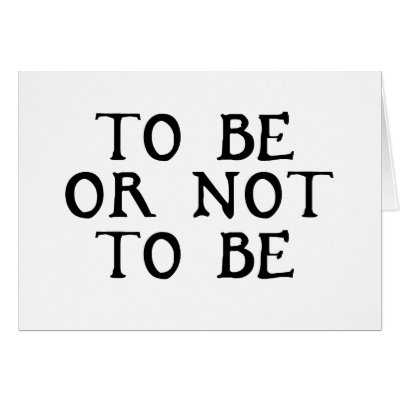HAMLET:
I'll be with you straight go a little before.
Exeunt all except HAMLET
How all occasions do inform against me,
And spur my dull revenge! What is a man,
If his chief good and market of his time
Be but to sleep and feed? a beast, no more.
Sure, he that made us with such large discourse,
Looking before and after, gave us not
That capability and god-like reason
To fust in us unused. Now, whether it be
Bestial oblivion, or some craven scruple
Of thinking too precisely on the event,
A thought which, quarter'd, hath but one part wisdom
And ever three parts coward, I do not know
Why yet I live to say 'This thing's to do;'
Sith I have cause and will and strength and means
To do't. Examples gross as earth exhort me:
Witness this army of such mass and charge
Led by a delicate and tender prince,
Whose spirit with divine ambition puff'd
Makes mouths at the invisible event,
Exposing what is mortal and unsure
To all that fortune, death and danger dare,
Even for an egg-shell. Rightly to be great
Is not to stir without great argument,
But greatly to find quarrel in a straw
When honour's at the stake. How stand I then,
That have a father kill'd, a mother stain'd,
Excitements of my reason and my blood,
And let all sleep? while, to my shame, I see
The imminent death of twenty thousand men,
That, for a fantasy and trick of fame,
Go to their graves like beds, fight for a plot
Whereon the numbers cannot try the cause,
Which is not tomb enough and continent
To hide the slain? O, from this time forth,
My thoughts be bloody, or be nothing worth!
Exeunt all except HAMLET
How all occasions do inform against me,
And spur my dull revenge! What is a man,
If his chief good and market of his time
Be but to sleep and feed? a beast, no more.
Sure, he that made us with such large discourse,
Looking before and after, gave us not
That capability and god-like reason
To fust in us unused. Now, whether it be
Bestial oblivion, or some craven scruple
Of thinking too precisely on the event,
A thought which, quarter'd, hath but one part wisdom
And ever three parts coward, I do not know
Why yet I live to say 'This thing's to do;'
Sith I have cause and will and strength and means
To do't. Examples gross as earth exhort me:
Witness this army of such mass and charge
Led by a delicate and tender prince,
Whose spirit with divine ambition puff'd
Makes mouths at the invisible event,
Exposing what is mortal and unsure
To all that fortune, death and danger dare,
Even for an egg-shell. Rightly to be great
Is not to stir without great argument,
But greatly to find quarrel in a straw
When honour's at the stake. How stand I then,
That have a father kill'd, a mother stain'd,
Excitements of my reason and my blood,
And let all sleep? while, to my shame, I see
The imminent death of twenty thousand men,
That, for a fantasy and trick of fame,
Go to their graves like beds, fight for a plot
Whereon the numbers cannot try the cause,
Which is not tomb enough and continent
To hide the slain? O, from this time forth,
My thoughts be bloody, or be nothing worth!

Hamlet:
Everything in this world has shown me that I did make a great mistake; I should have revenge with haste. A man is contemptible if he only knows to eat and sleep. God did not give men cognitive abilities for us to leave it unused. No matter if it is oblivion, lack of courage, or precise thoughts; I continued to blame myself for my vain action. I have the will, power, and purpose to do it, but I did not finish the deed. In front of me, the massive army was moving with such courage and commitment. The ambition of the aristocrat has exposed him to such hazardous environment, which may endanger a man’s wealth and life. The reason for the march was just as thin as the eggshell. To be a great person does not mean he has to act upon justifiable reasons. The uprightness of the man is measured by his will to secure his fame when it is exposed to danger. Being a son with a father killed, mother soiled, I shamefully stabilize the emotional upheaval within myself. Watching with shame, a mass of man marched toward their grave for such trifling reason of capturing a worthless piece of land, which isn’t even good enough to bury themselves. From now on, I will have to think will malice, or else my thoughts will be valueless.
A man that thinks in Hamlet’s fashion will be an extreme pessimist, which is detrimental from our physical and mental aspects of our lives. But it is also an unavoidable side of our personality, there is not a person that is forever thinking positively. Man hates for different reasons, in regard of love, pressure, etc. We should all find ways to balance the positive and negative aspects of a thing. For example, laziness leads to bad grades, but too much pressure lead to poor performance on tests, etc. We should find ways to equalize the two extremes and managed them with calmness. A tragic life, like Hamlet, will be too overwhelming for people to just live through a day.
